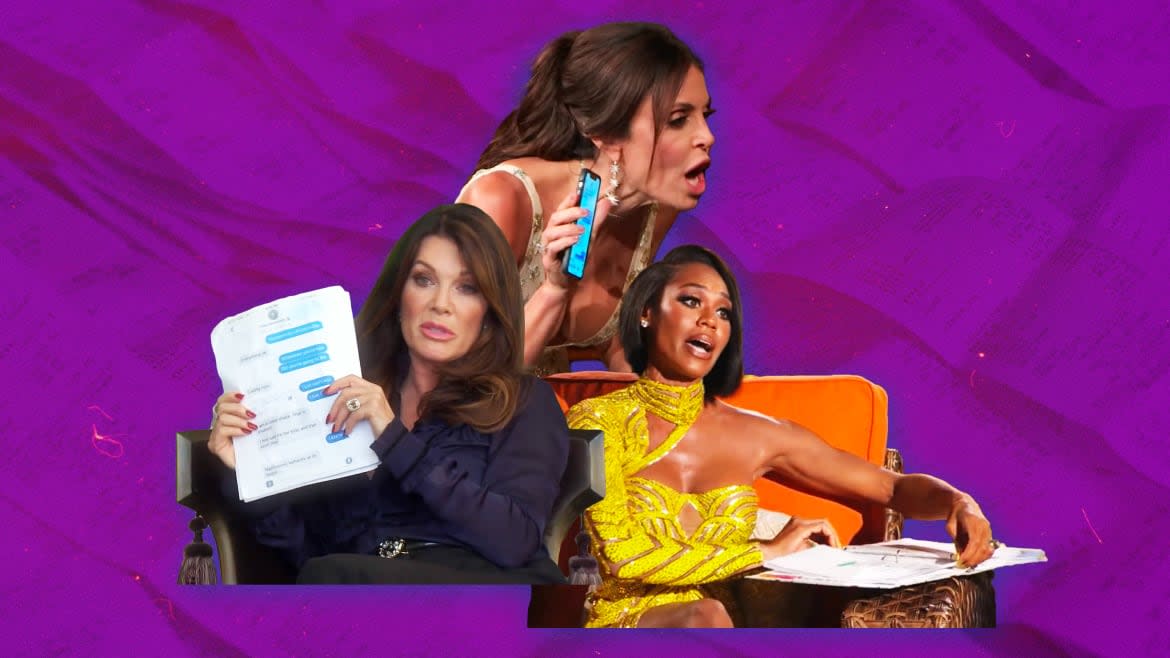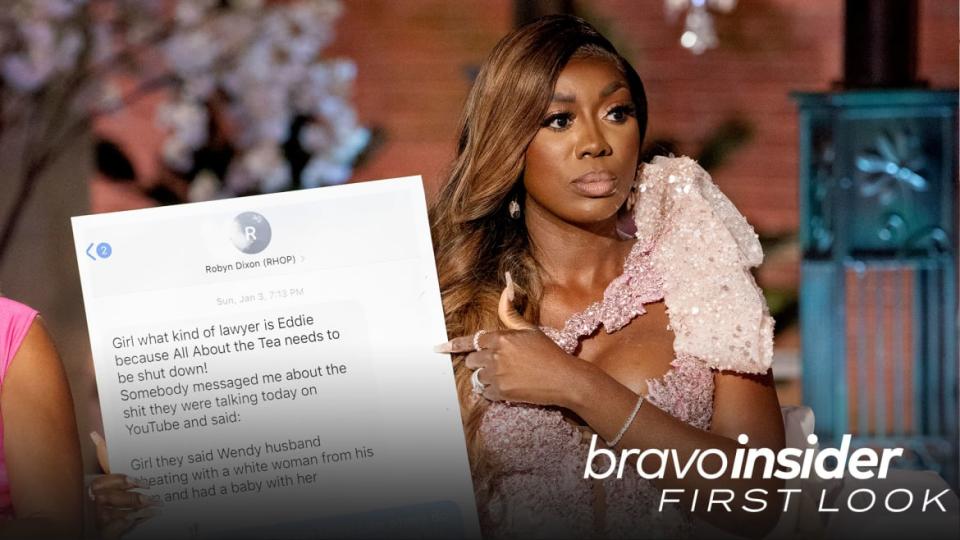The ‘Real Housewives’ Franchise Has a Major Receipts Problem

“If that’s your proof, show it!” urged Real Housewives of Beverly Hills star Garcelle Beauvais across the table of a glitzy 90210 eatery. “This is your time!” She was talking to her friend and co-star Sutton Stracke, who had been accused by their other co-star, Lisa Rinna, of backing out of paying for a table at Elton John’s AIDS charity gala at the very last minute.
In an attempt to prove her innocence to the jury of glamorous Real Housewives who were sitting around the table, Stracke slowly reached into her gold handbag and revealed a folded piece of paper. It was a print-out of an email exchange, which seemed to reveal that she had paid for at least two seats at the table for Rinna and her husband, actor Harry Hamlin. After surveying the evidence like a judge in a crucial trial, Beauvais concluded: “She paid for the table, y’all.”
“Receipts” have gradually become a huge part of Bravo’s Real Housewives franchise. In the case of Stracke vs. Rinna, the bombshell “receipt” was, quite literally, an American Express receipt for $11,500. But the term is used more widely to refer to a record of something, like a shady conversation or a disputed invite to an event, which was sent digitally.
The term, of course, originated from a 2002 tell-all interview of Whitney Houston by Diane Sawyer, who asked the singer to verify reports that she had an expensive drug habit. Houston laughed and responded: “No way, no way. I wanna see the receipts. From the drug dealer that I bought $730,000 worth of drugs from. I wanna see the receipts!” Houston’s quip was immortalized in GIF form and “receipts” became a popular term among the LGBTQ+ community. When Black drag queens made it part of the lexicon on RuPaul’s Drag Race, it went fully mainstream—and the rest is history.
Lisa Kudrow Is Ready for Another ‘Comeback’
Now, the Real Housewives can’t get enough of sharing “the receipts.” And they’re not just dropping them on the show, to gasps from their co-stars and the audience at home, they’re posting them on social media too. But what started off as a fascinating addition to the franchise is fast becoming a thorn in its side, which is in danger of derailing it and spoiling the fun.
If we look back to the start of the Real Housewives franchise, when social media was brand-new and reality TV was also still in its relative infancy, reality stars had fewer ways to correct the record—or commentate on the show as it was airing. Some of the Housewives would write “Bravo blogs,” which were published (and presumably proofread) by the network every week. According to Brian Moylan, author of The Housewives: The Real Story Behind the Real Housewives, writing a Bravo blog was the only way the cast could receive an advance screener of the upcoming week’s episode.
With a lack of other options, most of the arguing over what really went down on the show was saved for the reunion episodes, where host Andy Cohen would recap the season with the cast. At reunion tapings, the “fourth wall” which separates reality stars from their audience was fully down, so the wives would often bring evidence with them, like print-outs of text, which they thought backed up their narrative. (“I did call you when you were sick!,” “you did ask me not to film with her!,” “we did agree to meet!”). Gradually, this has escalated: in the Season 5 reunion of The Real Housewives of Potomac, Monique Samuels brought an entire binder of receipts with her, printed out and color coded, including salacious text messages sent by the former husband of one of her co-stars to another woman.
In recent seasons, receipts have had more of a presence on the regular episodes too. Season 9 of RHOBH centered on a conflict between former cast members Lisa Vanderpump and Teddi Mellencamp. Vanderpump dramatically printed out text messages sent by Mellencamp in an attempt to prove she had plotted off-camera to smear their co-star Dorit Kemsley. Season 10 of The Real Housewives of New York City was similarly anchored by a fallout between Bethenny Frankel and Carole Radziwill, featuring a man known as “red scarf guy,” much of which played out over texts. (These were, of course, later read out as the cameras rolled).
As ridiculous as some of these conflicts might seem, the popularity of receipts on reality TV isn’t entirely separated from what we see in the “real” world. As our lives have become more digitized and more of our conversations are happening over text, it is common for screengrabs of private conversations to be brought into arguments. As always, chaotic celebrities do it best: Who could forget Azealia Banks leaking her bizarre text exchanges with Grimes in 2018, which, among other things, discussed the size of Elon Musk’s penis?
Texting goes right to the core of the appeal of reality TV. The genre has become such an influential medium, in part, because it captures how much of our personal relationships now happen through our phones. And it’s not just about how much we text, but how people are communicating when we do. Scripted TV and films have often struggled with portraying this in a way that feels realistic and entertaining. Writing on this very topic, culture writer Lauren O’Neill argued that Netflix’s queer teen romance Heartstopper was one of the first scripted TV shows to get texting right. “For something that is basically a fundamental part of daily life the world over, television is still fairly horrible at realistically incorporating the ways in which we communicate via message,” she wrote. Reality TV, on the other hand, has never had this problem.
The presence of receipts on Housewives initially felt exciting. In the days when the “fourth wall” was much more rigid, receipts offered us a glimpse into the off-camera strategizing which we knew must happen: the texts between the ‘wives, where they would plan who they were going to target next in the Chanel-clad Hunger Games.
But receipts are fast becoming a hindrance. In last season’s RHOP reunion, cast member Dr. Wendy Osefo went to the trouble of getting text messages with her co-star Robyn Dixon printed on a giant board, which she brought with her. Not only were the messages not the “smoking gun” she thought they were, but her castmates were unimpressed by the gesture, saying: “You actually spent money on this?” What would have once seemed like a box office-style, GIF-able moment fell flat.
In the case of Stracke vs. Rinna, on the latest season of RHOBH, Rinna went on Instagram after the episode aired and released a hailstorm of her own receipts. This has become a regular occurrence: there is barely a week that goes by without one of the Housewives (or former Housewives) questioning the narrative with screenshots posted on social media—and these receipts are losing their shock value each time.
In a recent appearance on Watch What Happens Live!, Rinna described herself as a “nightmare” on social media. Cohen (the host) agreed, calling her “a double disaster.” This was in reference to her constant social media beefs and public receipt-reveals on her castmates. Most recently, Rinna made some bizarre allegations against her co-star Kathy Hilton. In now-deleted posts, she suggested that Hilton had paid LA marketing manager Patrick Somers to sully her reputation and share her personal phone number on Instagram. The multi-day drama featured some unverified and unconvincing screenshots. Frankly, the whole thing felt mildly ridiculous and staged. And given Bravo’s notorious dislike for castmates sharing screenshots when they’re not on the show, it’s hard not to suspect Rinna might be Instagramming herself out of a job.

Dr. Wendy Osefo shows some giant receipts on The Real Housewives of Potomac reunion.
In an era where the scandal-hit Housewives franchise has begun to feel more like a true-crime docuseries, receipts have been a valuable tool to help the audience cast themselves as the detective, analyzing crucial evidence before assigning blame and guilt. But when they are overused on the show, or used too much outside of the show on social media, it all begins to feel too messy. These extra details go from thrilling bombshell to tiresome technicalities.
It would be inauthentic to pretend that reality stars don't speak over text, particularly about the show, when the cameras aren’t rolling. (After all, many of the Housewives are actually friends and that is how friends communicate). But when we receipts them too often, they end up undermining the events we see on-screen.
By showing us so many DMs, text messages and even call-logs, some of Bravo’s Housewives are making us feel like we’re hardly getting any of the real story on the show. And that might be true, but surely part of the job description of a reality star is maintaining that mirage to some degree? The messiness that receipts often create is a reminder that Bravo’s many producers and editors exist for a reason: it takes skill to present these narratives in a way that is entertaining and easy to understand. And it’s also a reminder of a truth that fans don’t want to be constantly confronted with: that reality TV and reality are two very different things.
Get the Daily Beast's biggest scoops and scandals delivered right to your inbox. Sign up now.
Stay informed and gain unlimited access to the Daily Beast's unmatched reporting. Subscribe now.

 Yahoo Movies
Yahoo Movies 
